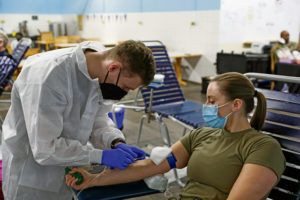
The holidays may be over, but the spirit of giving is stronger than ever during National Blood Donor month in January. Service members with the 512th Field Hospital, 519th Hospital Center, 30th Medical Brigade know the impact blood donations have on Army readiness and capability.
“Blood donations are more than important — they are mission essential,” said 1st Lt. Carter Howell, surgical nurse with 519th Hospital Center. “Just one trauma event downrange can wipe out a supply from one full drive,” said Howell.
She added that providers and deployed medical forces are not considered capable if they do not have the required blood inventory, so donating on a regular basis is the best way to prepare for future emergencies.
Howell and other 30th Med. Bde. Service Members regularly support the Armed Services Blood Program, the official blood program of the U.S. military.
“Blood donors who take the hour out of their day are helping maintain the blood supply for our own military and ensure we have blood on the shelves when it’s needed,” said Capt. Melissa Miller, chief of the Armed Services Blood Bank Center – Europe. “All the blood donated with the ASBP stays within the military, to help forward-deployed U.S. and NATO service members around the world and also patients in military medical facilities like Landstuhl Regional Medical Center.”
While stationed in Hawaii, Staff Sgt. Samantha Covert, noncommissioned officer in charge of the field hospital laboratory, saw firsthand why proactive blood donation is so important before a traumatic event happens.
“At Tripler Army Medical Center in 2018, we had a mother who started hemorrhaging and we ran out of blood products within about two hours,” Covert said.
The incident prompted a surge in blood donations, and the patient was treated successfully. However, not every outcome will be favorable because new blood donations require extensive testing and cannot be used right away. The testing process is done to ensure that patients receive the correct blood type, minimizing the chances of a negative transfusion reaction.
With her experience in the blood bank at Landstuhl, Miller understands only too well how this works.
“Often when a military hospital or blood bank runs low on blood, we have to reach out to local organizations to get blood that has been tested and will be safe for that patient,” said Miller. “When blood banks get a surge of donations following a tragedy in the news, that blood will still need to be tested so it will typically help replenish the blood supply for future patients.”
In a deployment setting where blood is not always readily available, the military offers a unique solution – walking blood banks. These can allow service members with matching blood types to donate immediately to their peers in an emergency setting. Walking blood banks rely on prior testing of potential blood donors and is only used when other resources are unavailable.
“Soldiers will always donate for other Soldiers” said Howell.
Giving blood can be incredibly satisfying. For Capt. Shelby Aleksick, intensive care unit nurse with the 519th Hospital Center, seeing what a unit of blood will do for a patient’s disposition is the most significant reward.
“In a matter of six hours, you’ve pumped life back into a person,” said Aleksick.
Donors can make a direct impact on the well-being of their fellow service members and families by visiting www.militarydonor.com and search by the Sponsor Code: Europe to find mobile blood drives and schedule appointments. When blood drives are full, donors can join a wait list using instructions on the website or by emailing usarmy.donate-blood@mail.mil.
Donors who have never been pregnant and have Blood Type A, B or AB are also needed to donate platelets and plasma at the blood donor center on Landstuhl. Appointments are available Mondays-Thursdays, and appointments are available by calling DSN 590-7501, or 06371-9464-7501.


